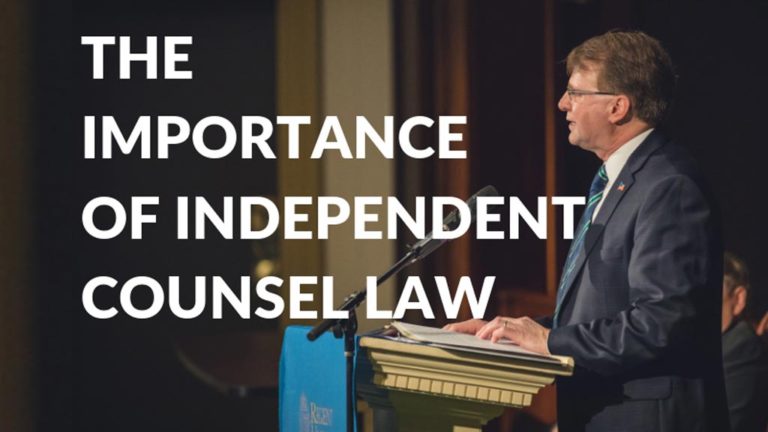King Kong and Election 2024: The Sovereignty of the God of Nations
Editor's Note: The views and opinions expressed in this article are those of the author and do not necessarily reflect the official policy or position of Regent University, its faculty, administration, or affiliates.
Were King Kong striding across some unknown jungle, he might be surprised to hear an ant challenge him to a fight. The scenario is as laughable as it is impossible.
Yet we humans are really not so different than that defiant insect. “Why do the nations rage and the peoples plot in vain?,” asks David in the second Psalm. “The kings of the earth set themselves, and the rulers take counsel together, against the Lord and against His Anointed, saying, ‘Let us burst their bonds apart and cast away their cords from us’” (vv. 1-3, ESV).
In other words, the absurdity of human rebellion to God, Who spoke the universe into being, is ridiculous. Yet we do it, all of us. To reject God’s right to rule is not only futile but pathetic. Still, all of us “have gone astray; we have turned-every one-to his own way” (Isaiah 53:6).
In the same way, so it is, and has always been, with nations. The Bible’s first account of man’s attempt at godless government occurs in Genesis 11, when the collapse of Babel led to geographic diffusion and the creation of multiple language-groups. “The whole earth” — inferring a single people-group — “had one language and the same words,” writes Moses. They had “migrated from the East,” a provocative phrase implying a mass exodus, to the “plain of Shinar,” an area in what is now Iraq.
In Hebrew “babel” refers to the mixture of oil with flour. By inference, it means confusion — the muddle of substances with no native relationship. So, there is a word-play here: What the ancients thought would be their “gateway to God,” their own self-created pathway to God’s presence (“let us build … a tower with its top in the heavens”), culminated in their confusion and dispersion.
This was only the first time humanity has sought to develop a unitary government, one with authority over all people. While the scale was undoubtedly small, the principle was the same as one common today: man seeking to construct a perfect society without the only Being Who is perfect.
Even though this cautionary event happened early in our history, its lesson still escapes us. Throughout the ages, man has tried to build cultures and countries in which a given leader is exalted to godlike status or in which a nation-state is imbued with mystical, spiritual authority.
Consider Italy’s dictator of the 1920s and 1930s, Benito Mussolini. In his 1932 book, The Doctrine of Fascism, he wrote, “For Fascism the State is absolute, individuals and groups relative … the Fascist conception of life stresses the importance of the State and accepts the individual only in so far as his interests coincide with those of the State, which stands for the conscience and the universal, will of man as a historic entity.”
In our time, the mass-murdering dictator of North Korea, Kim Jong-Un, is, among other things, the “Dear Respected Comrade Kim Jong Un, Chairman of the Workers’ Party of Korea, Chairman of the State Affairs Commission of the Democratic People’s Republic of Korea and Supreme Commander of the Korean People’s Army.” My personal favorite: Kim is “the banner of all victory and glory.”
The sheer arrogance, even silliness, of such things is only magnified by the horror they impose on those being ruled by men who adopt these kinds of titles. When political leaders assume divine designations, they reveal only that their pride has vastly outdistanced their grasp on reality. Indeed, twice in the psalms, David assures us that the Lord laughs at the nations and “holds them in derision” (Psalm 2:4, 59:8).
In our time, it’s pretty clear that our world is catching fire. Whether the vicious brutality of the Islamist attacks on Israel, the wholesale violence in the Sudan, or the unprovoked Russian assault on the Ukraine, we are witnessing outbreaks of moral squalor whose cruelty is abetted by their frequency. The nuclear programs in Iran and North Korea, as well as China’s unapologetic efforts to intimidate other countries and control their own citizens, endanger millions.
It should be our prayer that America’s leaders pursue policies in which resolve, strength, and wisdom are embodied. Yet concern should not lead us to panic, to cower, to despair.
Why? Because God’s sovereignty is woven into the Bible’s 66 books like DNA is in the human body. “He changes times and seasons; he removes kings and sets up kings,” writes Daniel (2:21a). His own earthly sovereign, Nebuchadnezzar, concludes that “the Most High rules the kingdom of men and gives it to whom He will and sets over it the lowliest of men” (4:17b).
Nothing has changed since Daniel recorded those words. The Eternal God is our refuge and fortress, yes, but He is also the God Who remains unthreatened by human efforts to usurp His reign. Consider the best example of all, the Lord Jesus. Pilate said to him, “You will not speak to me? Do you not know that I have authority to release You and authority to crucify You?” Jesus answered him, “You would have no authority over Me at all unless it had been given you from above” (John 19:10-11).
In this calm, but what must have seemed to Pilate astonishing, the Lord of all affirms both the divinely drawn limits of human political authority and the unlimited power of God Himself. These truths should infuse all Christian musings about human government.
As the election draws near, one thing must be remembered by all followers of the Resurrected One: Whatever November’s outcome, we can rest in the knowledge that the God, Who “declares the end from the beginning” (Isaiah 46:10), remains our Father and our Friend. He is faithful — without qualification. Whatever befalls us individually or as a country, let’s all be sure to keep our eyes on Jesus, the eternal Lord, Who has a plan for human history that no person, human institution, or political endeavor can ever thwart.







